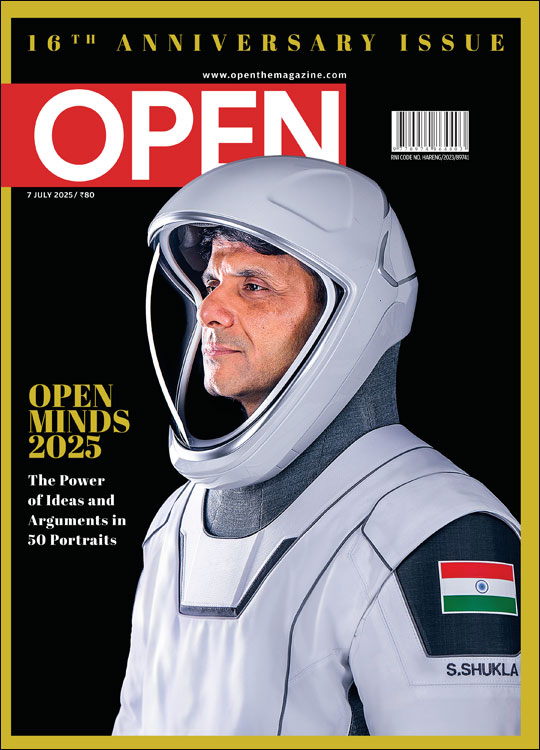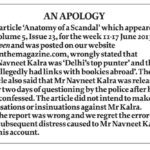Manmohan Singh: The Autumn Of The Abandoned
The humiliation of Manmohan Singh, now an accused in the coal allotment scam, continues even after his 7 Race Course Road days. The pain of being let down by erstwhile loyalists and protégés is not lessened by the fig leaf of support offered by the party at the last minute
/wp-content/uploads/2016/01/18118.theautumn1.jpg)
When the phone rang at the Lutyens’ Delhi residence of former Prime Minister Manmohan Singh on 11 March, it seemed shriller than usual. The number was not unfamiliar. The caller confirmed what Singh had been dreading: he had been summoned for questioning by a special court in the coal block allocation scam case as an accused. A short while later, a priority call was put through from the Singh residence to the man who has for long been known within the Congress Party as a trouble shooter for everything from A to Z. The fingers that worked the keypad betrayed none of the anxiety that the caller may have felt. At the other end, a trusted aide of the Congress party’s president answered the call.
The man who received Sonia Gandhi’s trouble shooter appeared a far cry from the usually gentlemanly, sober and collected Manmohan Singh, who was Prime Minister of India for 10 long years. He looked flustered and seemed nervous. Even his trademark light blue turban was askew. It was clear that the news delivered to him, that he was Accused No 6 in the coal block allotment scam, had given him a jolt of sorts. Singh has always been reticent; a man of few words who stays dignified under pressure. “This was shocking to those who met him that day,” says a political leader.
Earlier that day, almost immediately after he received the news of his summons to court over the case, Singh had sought to contact his one-time private secretary, then joint secretary in the PMO, BVR Subrahmanyam. Along with his one-time advisor in the PMO, TKA Nair, Subrahmanyam was among those who the special court had directed the Central Bureau of Investigation (CBI) to record the statements of in the coal scam. The statements of Nair and Subrahmanyam had already been recorded by the investigative agency. The former Prime Minister expected to consult these bureaucrats whom he had once picked to work with him in the PMO, confided in, trusted and relied heavily on. The phone rang many times. But to Singh’s disbelief, Subrahmanyam, a Chhattisgarh cadre officer he had stuck his own neck out to retain in the PMO, refused to entertain the call from his former boss.
Those in the know of that meeting with the Congress president’s aide contend that the disturbed Singh, perhaps for the first time, appeared shaky about the position he had adopted and stuck to on the coal block scam: that he had nothing to hide and had done nothing wrong. The calm confidence with which he had intoned in end 2013—“I am not above the law. Let CBI, or any other agency, question me on the coal block allotment issue. I have nothing to hide”—was now punctured. Narrating the Subrahmanyam call episode and other developments of the day to the Congress insider, Singh now sought urgent reassurance that the party’s top leadership would stand by him on the issue. The Congress leader, a man who bore many a cut and nick each time trouble hit senior party leaders (and he was despatched to resolve matters), sought to calm Singh, assuring him of the party’s across-the-board support.
Summoned as an accused—along with five others—in the coal block allotment case, the former Prime Minister will have to appear in court on 8 April. Among the charges levelled by the CBI against the man who was once in charge of the Union Coal Ministry, are criminal conspiracy, corruption and breach of trust. Ironically, the very commendable personal qualities he was admired for appeared to have aided the investigative agency in framing these charges against him, overturning the findings that it had cited in its closure report several weeks ago to the special court. It had found Singh not culpable of criminal intent or motivated intervention in the allocation of the Talibara II and III coal blocks in Odisha to Hindalco, a private aluminium company. But the special court had rejected the report and directed the agency to probe his role in the issue further, transforming his status in the case from a witness for the prosecution to an accused.
Soon after the CBI’s move, former ministers Ghulam Nabi Azad and Anand Sharma took the distraught Singh to Parliament to meet a senior Cabinet minister in the Modi Government to discuss his troubles over the coal block allotment issue and 2G scam. “It was a sad sight to see the always composed and collected Doctor Saheb in the state he was in,” a senior BJP leader tells Open. “But one had to be aware that if the institution and powers and accountability of the Prime Minister of India had eroded actively and suffered intense attrition in the 10-year period that Singh was PM, it was to a good extent because he was a willing party to it,” he adds.
Some Congressmen have a different take on the Congress leadership’s seeming desertion of Singh. “From the first time Singh’s name cropped up in the coal block scam case, the Congress top leadership had left him to fend for himself until after his tenure as Prime Minister,” says a Congress leader. “He’s been ploughing a lonely furrow after having served the Gandhi family faithfully for ten long years. It is, after all, a party that unceremoniously dumped PV Narasimha Rao and threw him to the wolves over the JMM bribery scam. And Rao was no ordinary Congressman, he was a fine political mind. If they could do that to Rao, what stops them from doing it to Singh, who is not a politician by temperament? It’s only natural that he was apprehensive and distraught.”
Once Sonia Gandhi’s aide had met Singh and reassured him of party solidarity, the Congress leadership lost little time hot-footing it, under the president’s direction, to the former Prime Minister’s residence. The day after the summons were issued to him by the special court, a posse of leaders descended on the thus- far deserted home of the Singhs. “We offer our unstinted support and solidarity to Dr Manmohan Singh,” Sonia Gandhi said, adding, “The Congress party is fully behind him.”
The understated Singh said he was “grateful” for the support of the leadership. “In fact, he was so dejected soon after the summons, that he had resigned to the possibility of being thrown to the wolves and having to fight it out alone in court to establish his innocence, [so much so] that he almost turned down the offer of senior Congress leaders marching to his house in a public show of support,” says the Congress leader.
The fact that a ‘grateful’ Singh had allowed the leadership to trample all over him while in office, many believe, was his big undoing. He had it ‘coming’, as the phrase goes, as an upshot of the humiliation, isolation and bullying he endured, not to mention his portrayal as the Family’s biggest fall guy—all of which, according to his one- time media advisor Sanjaya Baru, a few in the PMO had tried to resist. For Singh, Baru’s The Accidental Prime Minister was among the unkindest cuts. And the timing of the book’s release dealt a palpable blow below the belt.
It was Singh who had inducted Baru, a financial daily’s editor, into the PMO as his press advisor, and the former Prime Minister had always been indulgent towards him. In his book, Baru offers all manner of exaggerated details on the ‘heads-I-win, tails-you-lose’ relationship the mother-and-son Gandhi duo shared with his boss. Despite the embarrassment of Baru’s book, a gentlemanly Singh preferred to keep a stiff upper lip and not stoop to badmouthing the man who once had his trust and confidence. In a review for The Indian Express, Harish Khare, a political commentator and Baru’s successor as Singh’s media advisor, noted: ‘Even in its gossipy, catty way, the book is problematic on a number of counts. First, it is breathtaking in its cheeky presumptuousness, totally unwarranted, unmandated, and unsustainable. A reader can be excused if he gets the idea that he is reading not the scrappy recollection of a mere media advisor, but rather the memoirs of a co-prime minister.’
Singh’s travails did not end there. In an interview to a popular TV news channel in September 2014, just months before the Lok Sabha polls, former Comptroller and Auditor General Vinod Rai, who was to come out with his tell-tale book, Not Just an Accountant, alleged that Manmohan Singh had the power to avert high-profile scandals like the ones involving 2G spectrum allocation, coal block allotment and Delhi’s Commonwealth Games preparation, but had failed to put his authority to good use and allowed his government to get bogged down in a quagmire of corruption. Soon after, senior Congress leader and former Union minister Kamal Nath publicly distanced himself from Singh on the issue by pointing to a letter he had written registering his objections to the ‘first-come, first-serve’ policy of spectrum allotment and how it could bring disrepute to the Government. “He should have acted on the warning,” Nath maintained, acknowledging that he “could have made a mistake.” On the allegations being made by the BJP leadership over Sonia Gandhi’s involvement in the scam, though, Nath was aggressively vocal, dubbing it ‘rubbish’; his stance could only have confirmed Singh’s worst fears at the time: that his party was dumping him on the coal block allotment case.
Ironically, on the multi-crore 2G spectrum scandal, the CBI court had directly referred to a statement made to it by Singh’s former personal secretary Subrahmanyam, who was now ducking calls without compunction. “He stated that Singh as the departmental minister would go through what the Secretary, Minister of State and officers below in the PMO had written in the file. He further stated that [Singh] was a thorough and diligent person,” the court’s judge said, “He further stated that he is so stating on the basis of his experience of DOPT of which also Singh was the Minister In- Charge… He also pointed out that on the letter dated 7.05.05 of Birla received by Singh, he had made an endorsement ‘action as desired by the PM’ while marking it to the Principal Secretary, PMO.” Judge Bharat Parashar of the CBI special court, in his order detailing why Singh was being summoned as an accused in the coal scam, stated that Singh had “desired” that Kumar Mangalam Birla’s request for the Talabira II coal block got “priority”. Referring to Singh’s interventions, he also cited Singh’s letter to Coal Secretary PC Parakh in 2005. Parakh had questioned the allotment process. Singh had also “ignored” advice by other officials, including KV Pratap and Javed Usmani, showing “undue interest” in the case. All of that, the judge said, “prima facie shows a conscious effort on Singh’s part to somehow accommodate Hindalco.” The noose appeared to be tightening around the former Prime Minister’s neck, figuratively speaking.
In 2012, the Supreme Court, in an earlier ruling on a case filed by Subramanian Swamy alleging an inordinate delay on Singh’s part in granting sanction to prosecute former Telecom Minister A Raja in the 2G case, had ruled that a prime minister was not expected to personally look into the minute details of each case placed before him and has to depend on his officers. However, it set aside summons to industrialists Sunil Bharti Mittal and Ravi Ruia last month in what is known as the additional spectrum allocation case. That ruling exonerating Singh in the 2G scam, however, could not be extended as a matter of course in the case of the coal block allotment scam, since, the judge said, it stood “on a different footing, as here, Manmohan Singh did not act in the capacity of a PM but as a Minister of Coal”.
“In the present case, he chose to keep the coal portfolio with him and thus prima facie he cannot claim that being Prime Minister he could not be expected to personally look into the minute details of each and every case,” Parashar said in his order. He said there was no evidence to put other PMO officials on trial in the matter.
In Parashar’s jam-packed court room, there were gasps of disbelief when he first named five of the accused, paused, and then called out Accused No 6 as the “then coal minister”. Parashar said his ruling on Singh was being made with a “heavy heart” and “full realisation” of the sort of impact it may have on the morale of the country as a whole. All six were directed to appear before the court in early April.
It was in September 2013 that the CBI investigating officer on the case had put on record what he called the “requirement” to examine Singh, then Prime Minister, as part of a lengthy list of “pending actions”.
In his first remarks after the court order, Singh said, “I am upset, but this is part of life. I have always said I am open for legal scrutiny… I am sure truth will prevail and I will get a chance to put forward my case with all facts.” He declared his respect for the judicial process, and said, “I hope in a fair trial I will prove my innocence.”
Sonia Gandhi’s open support for him, it appears, is the only significant relief he can count on for the moment.
The very week that Singh received his summons, Finance Minister Arun Jaitley asserted that the NDA Government would learn from these developments how not to resort to dubious decision making processes that could land the nation’s Prime Minister as an accused in court. “We must learn from this so that the incident is not repeated where a former Prime Minister is summoned by a court,” he said in the Lok Sabha. He noted that Singh had wanted to resort to coal block auctions as far back as in July 2004, soon after he took charge of the UPA Government, but was unable to implement this until the day he remitted office. “Because of this faulty decision that the [Government] must have the discretion, it is that discretion which is responsible for the present position in which the honourable former Prime Minister is being put,” Jaitley said in the Lok Sabha.
The near crisis in the country’s telecom sector after the previous Government failed to auction 2G spectrum also figured in the Finance Minister’s speech. A large number of licences granted during the UPA regime, many of them signed by the then Telecom Secretary Behura who was a close confidant of then Telecom Minister A Raja, were subsequently cancelled by the Supreme Court. “You read [Singh’s] correspondence with the then Telecom Minister and you knew from the uncomfortable feeling the gentleman had that something was going wrong but he could not stop the Telecom Minister,” Jaitley said.
Bureaucrats, at the centre of both scams that would come to hound Singh, figure prominently in the buzz around the Capital these days. On Monday, 16 March, the Government appointed a Tamil Nadu cadre IAS officer, TV Somanathan, as Joint Secretary in the PMO in place of former Prime Minister Manmohan Singh’s once-trusted aide Subrahmanyam. It was a quiet exercise, but one that put a firm full stop to the Chhattisgarh cadre IAS officer’s long stint at the PMO, which he joined as Private Secretary to Singh on 30 May 2004.
He was well past the maximum seven years allowed under deputation at the Centre, but had continued to stay on. He had been elevated by rank from Private Secretary to Joint Secretary during that period. But the Modi Government’s decision to finally shunt him out of the PMO would be the first time that the officer must return to his parent cadre in all his years as a bureaucrat.
It was in 2012 that Singh, as Prime Minister, requested Chhattisgarh Chief Minister Raman Singh to let him retain Subrahmanyam, his newly-appointed joint secretary in the PMO, in his post, citing “trust and confidence” as key reasons for this. When Raman Singh wrote to the Prime Minister asking for Subrahmanyam to be sent back to the state, Singh replied, ‘I need an officer who has the experience and the exposure in handling sensitive matters. The officer also needs to be someone who enjoys my trust and confidence. Due to these reasons, I have selected BVR Subrahmanyam…’ That special request ensured the bureaucrat’s continuance at the PMO.
The ‘trust and confidence’ that Singh reposed in the men and women he chose for the PMO, however, appears not to have been returned in kind. Baru and Subrahmanyam are not alone in abandoning Singh in the autumn of his life. To add insult to injury, former National Security Adviser Shivshankar Menon has compared the foreign policy of the UPA under Singh very poorly with that of the Modi regime, which he has described variously as “more vigorous” and “adept, successful and dynamic”. On the Indo-US civil nuclear deal piloted by Singh himself, Menon has said the real test would be whether American companies are “willing to do business”. It must have made Singh wince.
In mid-2014, former Coal Secretary Parakh’s own book seemed to show Singh in poor light as a politician; it raised questions over his authority within the Government he headed. Thankfully for Singh, the world of academia had few such doubts. In 2012, an honorary doctorate of law was conferred on him by Cambridge, with the Duke of Edinburgh Prince Philip doing the honours at the ceremony, and a pleased Singh said that his memories of the university ran deep. “The colour light blue is one of my favourites and is often seen on my head,” he said cheerfully, referring to his turban, always prim and proper in those days. But all that now looks like a distant memory. Manmohan Singh, in his loneliest of days, has no company except his own shrinking shadow.

/wp-content/uploads/2025/06/Cover-OpenMinds2025.jpg)












More Columns
Puri Marks Sixth Major Stampede of The Year Open
Under the sunlit skies, in the city of Copernicus Sabin Iqbal
EC uploads Bihar’s 2003 electoral roll to ease document submission Open